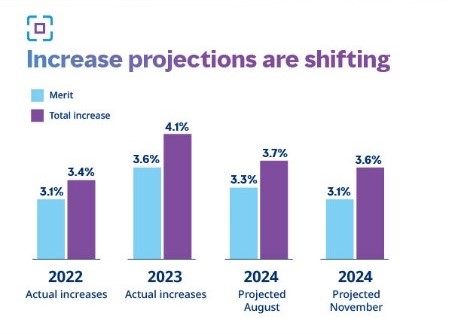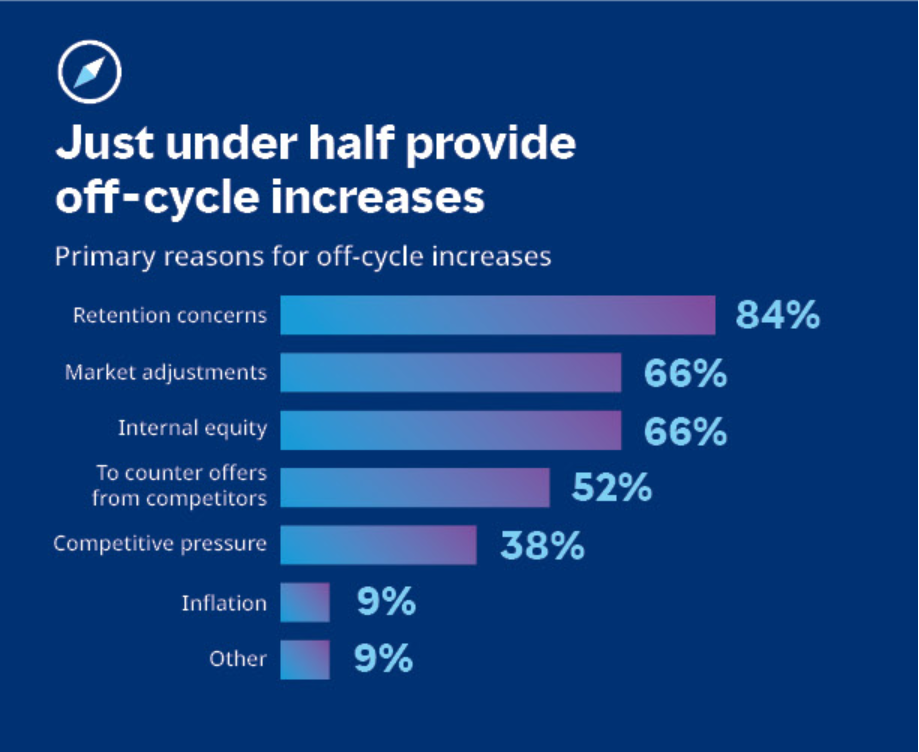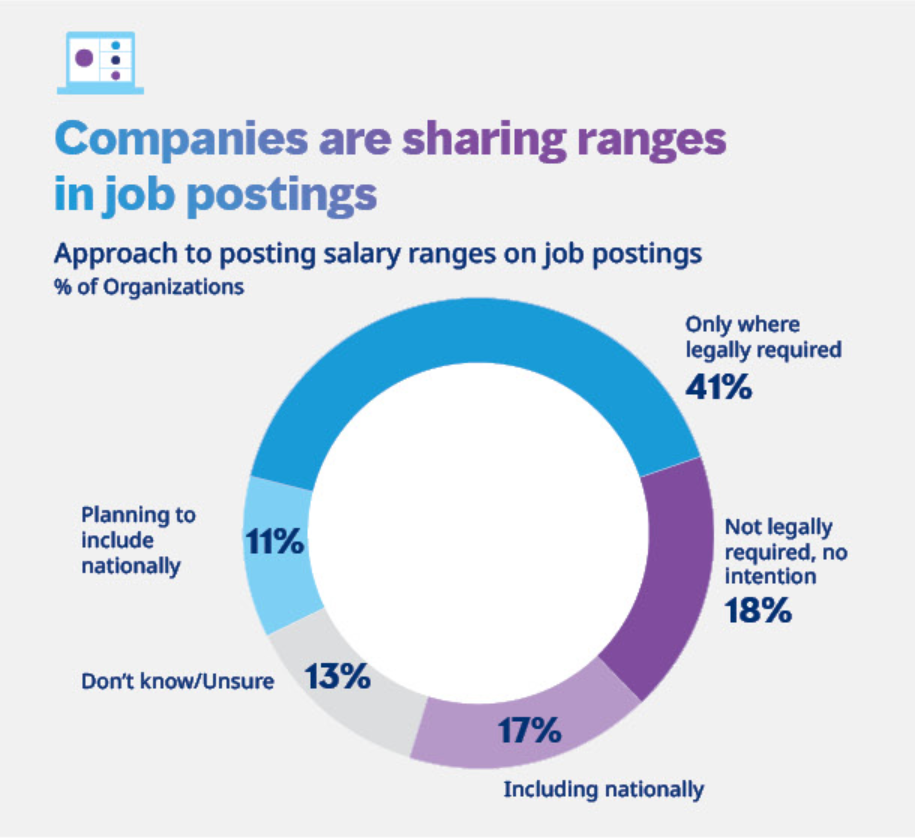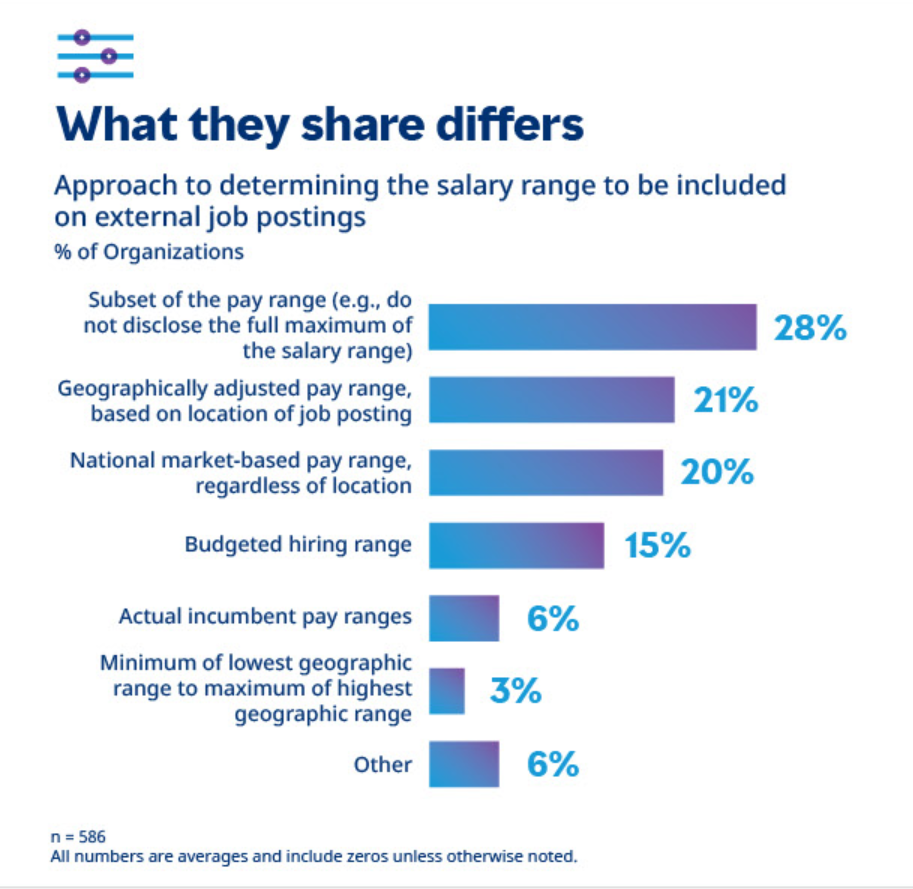Results of the Mercer QuickPulse™ - Canada Compensation Planning Survey

This article was provided by Mercer.
It’s the start of another new year and the latest employer forecasts for 2024 salary increase budgets are in, along with insights on promotions, off-cycle increases, salary structure adjustments, and some hot topics such as pay transparency. How does your plan compare?
Merit and total increase budgets
Both merit and total increase budgets are relatively unchanged from the last time we conducted the Canada Compensation Planning Survey in August.
Notify me when the next survey opens! You’ll receive the latest budget projection insights by participating.
On average, the almost 600 participants in Canada are forecasting 3.1% merit increase budgets and 3.6% total increase budgets. Both of these are lower than what was reported in August: 3.3% merit and 3.7%.
When comparing industries, there are some differences. Retail and Wholesale along with Energy are projecting merit increases of 3.5% and 3.3%, respectively, both above the mean. Those on the lower end include Insurance & Reinsurance and Services (Non-Financial), both projecting merit at 2.9%.
What’s important is that you take this information, along with other reputable sources, and determine what’s right for your company. Your annual increase budget should make sense for your industry, desired competitive positioning, financial outlook, etc. Additionally, ensure that your budget includes funds for any adjustments needed to re-align particular jobs or employees to mitigate pay compression or any necessary market adjustments.

Manager discretion for merit distribution
A question that comes up from time to time, particularly when you are revising your total rewards strategy, is “How much discretion should managers have when it comes to delivering merit increases?” or other pay adjustments.
To take a pulse check on where employers are with empowering managers to make pay decisions, we asked, “What limitations or rules do managers have when it comes to the determination of an individual's base salary increase?”
It seems that the most prevalent rules that managers must work within:
- Fall within the overall budget
- Fall within the salary range
- Fall into a recommended range provided based on select factors (e.g., position in range and performance)
- Incorporate increases determined by compensation (e.g., market adjustments or pay equity adjustments)
- Not exceed designated caps for pay increase
Additionally, 10% of responding companies said that discretion wasn’t applicable because merit increases are formulaic based on predefined factors.
On the other hand, 2% of companies (about 11) said that they allow managers ultimate discretion when it comes to the increase, with no limitations. The same amount of companies said that everyone receives the same merit increase.
Promotion practices
Although not much has changed recently in promotion practices, it warrants consideration because promotions and career development play such a significant role in the employee experience and total rewards strategy.
Employers on average are planning to promote approximately 7% of their workforce in 2024. On average, employees can expect to see a 9.5% pay increase for a one-level promotion.
Never miss an update again. Get the latest insights in compensation planning and total rewards. Notify me when the next survey opens!
Over half of employers are managing promotions through their existing salary and wages budget, or some other expense process. Just 15% of companies have a standalone promotion budget and are planning just under 1% of their budget to cover the increase in salaries due to promotions.
Off-cycle increases
As we’ve seen in the last couple of compensation planning reports, employers’ use of off-cycle increases has slowed, but not disappeared. Per capita base salary changes, found by comparing the average per person base salary change over a period of time, shows that pay has moved on average 4.2%, which is larger than what was reported as the actual increase delivered in Q1 of 2023: 3.6% merit and 4.1% total increases.
Just under half of employers reported that they have provided or will provide off-cycle increases in 2023, citing retention concerns, internal equity, and market adjustments as the most common reasons for doing so.
While 65% of companies don’t budget for off-cycle increases, most do have an extensive approval process that typically involves several levels of line management as well as Human Resources and Compensation.

Salary structures
For the 84% of employers that utilize a formal salary structure, just under 70% adjust the structures annually. Another 9% adjust them every 2 years.
Of those who plan to adjust their structure in 2024, the average projected salary structure increase is 2.9%.
Sharing salary ranges
We know that employers are having to be more transparent about their pay levels, whether because they are required by law or as a voluntary act to build trust among employees. Beyond where legally required, 17% of employers are including salary ranges in job postings nationally with another 11% planning to do so.
But what exactly are they sharing? If you take a look at job posting boards like Indeed, it’s obvious that what’s being shared is not consistent. When looking at a particular job, what’s shared as the pay range varies widely.
 Employers in the US Compensation Planning Survey reported that they most commonly are using the following in job postings:
Employers in the US Compensation Planning Survey reported that they most commonly are using the following in job postings:
- National, market-based pay range, regardless of (job) location
- Geographically adjusted pay range, based on location of job posting
- Subset of the pay range (e.g., do not disclose the full maximum of the salary range)
Addressing compression and internal equity

Increased pressure to be more transparent about pay means that employers have to prioritize addressing pay compression and internal equity issues. Twenty-two percent of survey respondents reported that they have not experienced compression or internal equity issues; another 20% stated they “don’t know” or are “unsure.” The remaining respondents stated that they have done the analysis and are making adjustments (28%), that they are considering making adjustments outside the annual increase cycle (9%), or that they plan to address in 2024 (21%).
Timely insights direct to you
Does any of this come as a surprise to you? Or, perhaps it differs dramatically from what your organization is planning for 2024? As you know, what’s important is that you understand what your competitors are doing and then make decisions that are right for your unique circumstances.
It can be difficult to keep up with relevant compensation trends and how they impact your organization.
Stay up to date with the latest insights on annual increase budgets, structure adjustments and incentive usage to meet your immediate compensation planning needs. Notify me when the next survey opens!
 Rebecca Hall is a Principal at Mercer with over 20 years of experience in compensation management and consulting, specializing in workforce rewards.
Rebecca Hall is a Principal at Mercer with over 20 years of experience in compensation management and consulting, specializing in workforce rewards.




